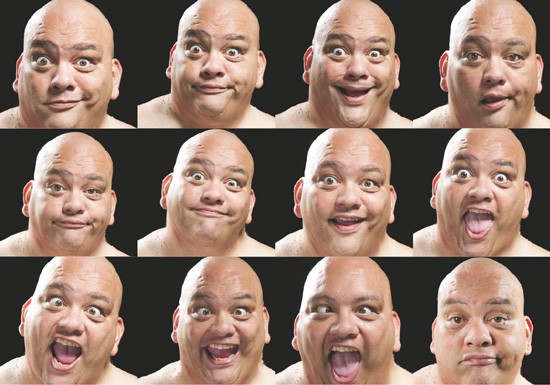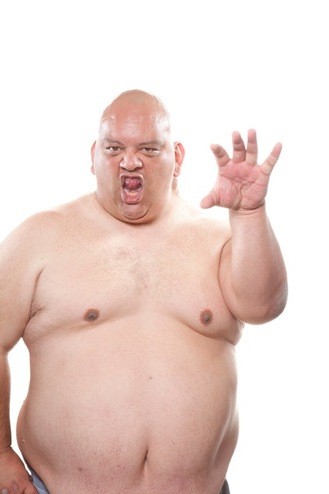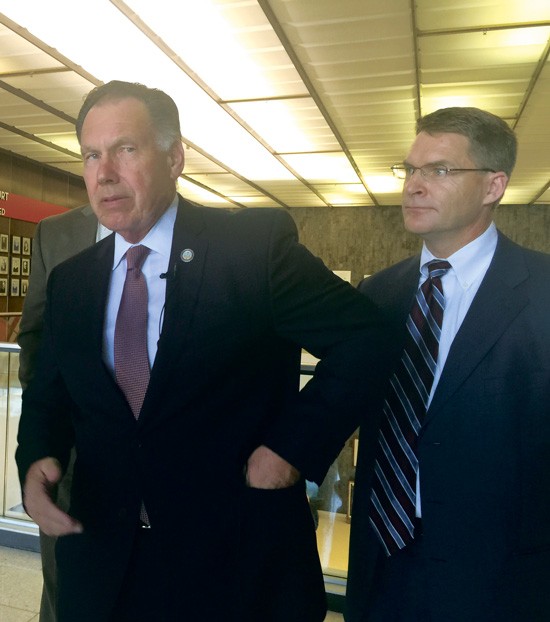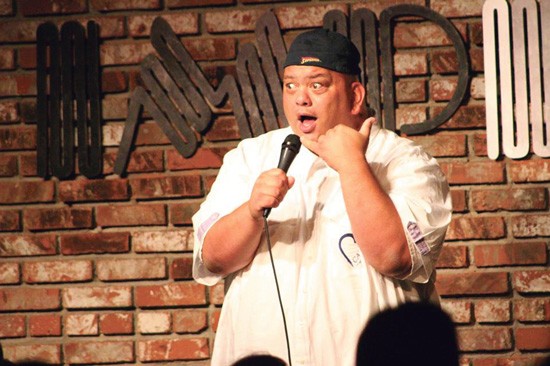
By Lisa Whittmore
This church of ours is open to all. . . . There will be no outcasts,” reads a banner looming over comedian Pat Leborio as he struts onto the stage. He's in the church hall of St. Clement's by-the-Sea Episcopal Church in San Clemente, ready to start a set for an audience that seem to be the last people on earth ready to listen to an hour of insults thrown their way: addicts.
Bald head gleaming, faded Dickies shorts reaching down to his calves and wearing a tent-like T-shirt that comfortably covers his 300-plus-pound frame, Leborio nods and smirks. It's time. His ferret-like eyes, bags underneath bruised so violet it looks as though he hasn't slept in a week, dart across the audience, looking for someone, anyone to trash. They land on a heavily tattooed man, seated in the second row.
]
“Whoa, you with the tattoos all over your face,” he snaps at a guy, whom he later learns is named Patrick. “You look pretty menacing; I'm kinda scared. I always wanted to get a tattoo on my neck . . . but I don't have a neck!”
An awkward hush hovers over the audience. Heads whip from Leborio to the tattooed guy and back again. Patrick bows his head and chuckles softly. The crowd erupts in raucous hoots and catcalls.
Leborio has seen the heights of the comedy world, from the Improv and Carnegie Hall to more than 85 commercials and meetings with Hollywood execs for shows and roles. But on this night, the 44-year-old is fine-tuning his act for his biggest fans: recovering dope fiends, tweakers and lowlife derelicts, many still residing in rehab, with Leborio at the front ready to make everyone laugh at their collective hell.
“I always heard they did a lot of meth in Riverside,” Leborio says from the stage. “But I didn't realize to what extent until I went to a sober convention, and there were, like, a thousand people and four teeth!”
And the crowd goes wild again.
In the unforgiving world of comedy, Leborio is distinguishing himself as equal parts Gabriel Iglesias and Richard Pryor: alternately loveable and harrowing, telling tales of a hardscrabble life mixed with hilarious rants. For the past 12 years, Leborio has made a career of lampooning recovering drug and alcohol users, ever since he took a look at a Jack and Coke and decided to get sober on the spot. He has largely left any dreams of the big time to work the rehab circuit, performing at clinics and 12 Step conventions and fund-raisers across the country–anywhere his people need him.
Most people speak about addiction in embarrassed, hushed tones. Not Leborio. He works the St. Clement's by-the-Sea crowd the rest of the night with panache. He gives a shoutout to the addicts in the house; hands shoot up in appreciation. F-bombs and sexual innuendos and street slang and sordid details of drug abuse spew from his mouth.
“We all remember plunging down the rabbit hole of this shit?!” Leborio shouts. Arching his arm downward, he likens using to an old-fashioned hunting party, with the addict being the rabbit. “The fucking chase is fierce, shots are fired, and DOWN THE HOLE WE GO!”
“Rather than focus on the negative or engage in morbid reflection, I slather humor on gaping wounds,” he explains after a standing ovation from the crowd. “My audience knows what rock bottom is–we fucking lived there!”
* * * * *
“Addicts fucking GET me way more so than the regular crowd,” Leborio says, pounding three shots of steaming espresso on a 90-degree day at a San Clemente Starbucks. He wipes the sweat from his brow and continues. “I mean everyone gets the weed jokes; weed is universal. The coke shit is too old. And with meth being such an epidemic nowadays, it's surprising how many normal people don't understand when I talk about how tweakers get shit started, but never done.”
Jerky hand gestures and manic eye-rolls suddenly erupt from Leborio; he's mimicking the mind of a meth head. “The radio dismantled into a million pieces, with a rusty screwdriver, on a cracked and peeling linoleum floor, in an apartment with no electricity! Addicts be claiming this shit.”
Leborio shouldn't be here–not relaxing in the Spanish Village by the Sea, not a free man, not alive. His easygoing way belies an indomitable, pluckish spirit–a Dickensian life as imagined by Chuck Palahniuk.
He was born on Dec. 12, 1969, and raised in working-class El Modena. His family, of Hawaiian and Portuguese descent, was a complicated mix of half and whole siblings, an absentee father, and a mother devoted to her herd. Leborio remains close with his younger sister, Shelby, and older half-sister and brother, Roxanne and John. “And moms, she is my heart,” he says with a grin, proud to share an apartment with his 79-year-old mother.
His hulking frame and nimble feet made Leborio a natural athlete. He played both baseball and football from the age of 9 for the Junior All American League in Orange, becoming a playground legend in the neighborhood. But the resulting popularity brought trouble to Leborio in the form of girls and drinking. “I was screwing chicks by the time I was 13,” he claims. By age 14, he preferred to black out with his friends after downing 12-packs of beer night after night.
But even as he drank himself silly every week, Leborio's future seemed bright. His skills as a bruising running back got him into Mater Dei High, where he played alongside Todd Marinovich, another heralded athlete whose life careened down the path of addiction. Halfway through his junior year in 1987, Leborio transferred from Mater Dei to El Modena High after arguing with his offensive coordinator.
The Orange County Register documented his transfer, and letters of interest came in not just from traditional college-football powerhouses, but also prestigious universities such as Brown and Stanford. A high-school yearbook photo from that era depicts a trim, fit, healthy young man grinning at the camera while balancing a football on his knee.
“See, I used to be good-looking!” he cracks.
Leborio received a hero's welcome upon transferring to ElMo. “One year, the cheerleaders basically kidnapped him, dressed him in the cheer outfit and made him perform the routine, skirt and all,” says Yvette Silva, Leborio's friend from high school.
“I was an instant celebrity at El Modena,” Leborio adds. “Compared to the grueling curriculum at Mater Dei, my classes were easy. I was breezing through them, getting straight A's, which freed up my time to drink nonstop.”
Leborio worked at a local liquor store from which he stole beers; he got cocaine from kids who wanted to hang out with him. “Part of the reason my drinking ballooned so out of proportion was that I never got into any trouble,” Leborio admits. “I mean, I musta been pulled over, like, 20 times, and they always let me go or drove me home because I was 'Pat Leborio, star athlete.'”
By his senior year, Leborio's grades slipped drastically and his attendance was sporadic at best. By then, “I played games where I was so drunk I could barely see. My nose would bleed profusely on the field from too much coke.”
After high school, Leborio enrolled in Rancho Santiago College (now Santa Ana College) to get his grades up and transfer to a Division I school for football. A torn meniscus exiled him to the Dons' bench the first season, giving him free time to drink and snort even more. He somehow was able to transfer to Bethany College, a Division III school in West Virginia, with the head coach flying out to California to personally recruit him.
Leborio vowed to shine, to make good on Bethany's trust and a new opportunity. But during his first year, West Virginia state troopers pulled him over. “I was so shitfaced. I couldn't see out of my windshield,” Leborio admits. He got out of the car and promptly fell.
Amazingly, the authorities let him go with no arrest; a friend drove Leborio home. But the cops did call Bethany's coach, who berated him yet didn't offer any punishment.
Salvation seemed to come in the form of a poetry class. During lectures, Leborio scribbled “rude, crude and utterly inappropriate” poems based on the antics of his close friends. Dared by a friend upon returning home to Southern California, Leborio did a few standup gigs on open-mic nights in clubs around the Southland.
“Being onstage was really a rush for me,” says Leborio. “I remember waiting seven hours, from 5 p.m. to midnight, outside the Comedy Store in Hollywood to perform for three minutes.”
Leborio had discovered how to funnel his drunken debauchery into something productive, one that quickly won over audiences. But when he realized that being sloshed onstage only heightened the applause, it was as if his universe were now perfectly aligned.
[

Probing Leborio on how and why he became an alcoholic is almost fruitless. A blank stare materializes. An uncomfortable laugh escapes, and his shoulders slump. There is no list of specific reasons. No plausible excuses. In his world, addicts simply enjoy the effect produced by alcohol and drugs. Until they don't.
“I never drank to escape or anything cliché like that,” Leborio carefully states. “I had a daredevil personality. I was mentally uninhibited. I loved being out of control, not being able to predict what was gonna come next.”
His alcoholism–and the growing figure that came with it–proved the perfect fuel to his fire. Leborio began performing at bigger clubs and scored a cameo in a Weezer video; at the after-party, he broke a Jack Daniel's bottle over a lamp, danced on an oak table and started a food fight. All the gluttony and boozing turned Leborio's chiseled physique into flab; now, Leborio was a crazy fat guy perfect for central casting.
He got into the world of commercials. His most famous is probably a 2001 piece for Reebok. Clad in only a traditional silk sumo loincloth, an enormous brass medallion and unlaced silver Reebok sneakers, Leborio slithers and slides, writhes and wriggles, pops, locks, and freezes across the stage while “Surfin' Bird” blasts on the soundtrack. B-boys and -girls goad him on from the perimeter; smug homies lean against the bar in a plush nightclub setting and nod their heads to the beat, with approving glances. “DEFY REASON” appears on the screen, followed by “DEFY CONVENTION”–ad campaign serving as biography.
But even as Leborio was getting noticed in the comedy world and fielding calls from Hollywood, his addictions were winning. In 2000, he auditioned for Son of the Beach, the short-lived comedy produced by Howard Stern. The role called for a “tranny geisha,” so Leborio applied his own makeup and donned a geisha outfit. He didn't rehearse any of his lines, thinking looks alone would win the role.
“Every time I got up onstage, I had to drink to get into this mode,” he says with a laugh. “Like this mode of 'I'm living on the edge,' just winging it, super-crazy vibe . . . It usually backfired!”
In his inebriated state, Leborio attempted his unrehearsed lines in what he felt was a Japanese accent. The casting director halted him mid-sentence.
“I don't know what's worse,” the casting director hollered. “Your fake Japanese accent or the smell of alcohol on your breath!”
“I don't know what's worse,” Leborio shot back. “This stupid audition or your goofy mustache!”
Leborio was physically removed from the set, with him shouting, “I think the part is still open!” to startled onlookers. He was so wasted he wandered the Paramount Studios lot for an hour, searching for his car. “I looked like Tinkerbell on crack.”
Nevertheless, Leborio got the chance to participate in a NBC showcase for Asian comics at the Laugh Factory in Hollywood, where studio execs sat in the audience looking for the next sitcom star. “I'm not Asian. I suppose I was chosen for my suave Samoan vibe,” Leborio says with a chuckle. “'Wasted' would've been the most applicable description.”
One of the execs prowled around backstage, dispensing comedy tips to the participants. Leborio wouldn't have it.
“Before I even got on the stage, I was tired of this lady telling me how to do my show,” he recalls. “So I went on, verbally accosted her, threw the mic into the balcony and walked off.”
Leborio's fellow comedians loved him for that diss; the Laugh Factory didn't, banning him for life. And a shot at TV fame seemed over.
The comedy circuit was still there, but Leborio's reputation was now preceding him. After a show at the Irvine Improv, fans offered congratulation at an after-party at the Yard House. Leborio remembered walking onstage–but absolutely nothing after that.
“I have no idea what I said–100 percent oblivious for the entire set,” he remembers. “I still have a bunch of pictures from that night. They are the only remaining evidence.”
Surrounded by an adoring crowd, Leborio ordered a Jack and Coke. He sat down and just stared at it. Leborio swears he experienced a “white light” moment, as a vivid memory of his mother flashed before his eyes from high school. In it, his mother is saying he's ruining his life with alcohol; then she threw all his college-football recruitment letters in his face and walked away.
“If I keep this up,” he finally realized, “I'm gonna die.” Barely a week later, on July 25, 2002, Leborio strolled into his first Alcoholics Anonymous meeting. It was at noon at Anaheim's 202 Club. He has kept up ever since.
“I shook for days,” he says. “When I was a youngster, I loved feeling out of control! That was the whole point. But I couldn't handle that feeling anymore.”
Not only did AA put him on the right track, but also he and other attendees formed a comedy group called Insanity Laughs. Their niche was regaling fellow addicts with graphic tales about their struggles with addiction and how they got sober. They tossed jokes into the audience detailing the awkwardness of early sobriety, the nagging desire to use, and navigating personal relationships without the comfort of drugs and alcohol. Without fail, they performed every Saturday night to a packed house.
“Shit, having to show up every Saturday night practically ensured my sobriety,” Leborio says, laughing.
“I've known Leborio for over 15 years,” Scott Wickenburg says. He had relapsed after his first wife died of a heroin overdose. On his first day back in sobriety, Wickenburg ran into Leborio at a meeting. “We cried that day. I was so pissed–angry at my wife, at myself, on the streets when I was using, I was always angry. But Leborio welcomed me back, hugged me, made some stupid joke, and we laughed. In sobriety, I NEED to keep laughing!”
Not willing to disappoint those who had come to rely on his comedic fodder to stay on the wagon, Leborio put one sober day after another.
By this time, all of Leborio's dreams of playing professional football or reaching mainstream comedic success were long gone. He loathed disappointing his mother, who once dreamed of her son reaching the NFL. But performing for addicts gave Leborio purpose. After his seven-year stint at the 202 Club with Insanity Laughs ended, Leborio co-founded the Lafaholix in 2010 with fellow aspiring comedian Vince Royale. Though not a substance abuser himself, Royale came from a family riddled with addiction. Royale lived around the corner from the 202 Club and became a regular at Leborio's shows, where he grew to appreciate Leborio's natural gift for helping people find humor in a subject that had previously caused only pain. The two bought a sound system and started bouncing around AA and Alano clubs and rehab facilities around Southern California.
“Pat supported me right out the gate, gave me a platform at the 202 to showcase my material,” Royale says in something of a growl thanks to his thick New York accent. “Hey, and I was a true friend as well. We used to go to Norms or Denny's late at night for all-you-can-eat pancakes after Lafaholix shows. That fool Leborio fell asleep in a plate of pancakes, all leaning to the side. I never seen anyone do that. I got it all on tape for when he hits the big time!”
Word-of-mouth within the sober community got the two gigs, which led to more gigs.
This was Leborio's big time.
[

Leborio's spirit of generosity extends well beyond making people laugh. After hit-and-runs in Anaheim and Santa Ana left a mother and three teenage girls dead, Leborio and three friends threw a benefit show near the 202 Club for the grieving families. On Nov. 16, the corner of Broadway and Lemon Street in Anaheim was cordoned off for it; Leborio served as master of ceremonies for four bands and another comedian. More than 700 people donated almost $4,000 toward the cause.
“I have seen Pat's show so many times I can recite most of his stuff, but it never gets old,” says Frank Waldrop, a friend of Leborio's since his Insanity Laughs days and sober for almost 22 years. “He jokes about the hijinks in sober living places and the absurdity of how addicts think. It's all stuff we have been through, relatable. Makes us laugh at how we take things so seriously.”
Cody Leslie, the assistant general manager of the Brea Improv, says that the club has booked Leborio at least a dozen times. “Leborio has a strong, local following. Our promoters know we can book Leborio from the Inland Empire to Hollywood, and he still has a big draw [and] reaches an audience.”
Leslie elaborates on Leborio's character, commenting on the size of Leborio's heart, and his involvement with charitable organizations. “During one such event,” he recalls, “Leborio donated all his earnings from the night to that charity.”
Leborio keeps his act tame at the Nov. 16 event; because of its somber nature, he focuses on poking fun at himself. As usual, when the comedian walked onstage, the crowd screamed his name, fawning over their hero.
“So, yeah, I'm Hawaiian,” he began. “Everyone thinks Hawaii . . . surfing.” Leborio paused. “What the hell would I surf on–a fucking garage door?”
The audience laughed loudly.
Next, he singled out a guy in the audience. “Whoa, look at that Hawaiian shirt–looks like a parrot exploded! And people pay, like, $200 for that!”
Bigger laughs followed. Leborio asked if anyone in the audience had ever been to Hawaii. “I lived there before,” he shared. “It's beautiful and all, but BORING, like Nebraska in the middle of the ocean! And the lava, that shit is dangerous. Ever notice white people are the only ones that wanna get all close and watch the lava flow? That shit will sweep you up, swallow you whole. Hawaiians ain't that dumb!”
The crowd loved it, hollering for more. Tricked-out Harley-Davidson motorcycles lined the sidewalks; heavily tattooed men and women grubbed on homemade tacos. A guy with a mammoth yellow python strutted around; face-painted children rocked out before the stage. A sober ordained minister, collar and all, carried a donation bucket. The attendees pounded Rockstars and Monsters; nary a soul is drunk or disorderly. They were all outcasts–Leborio's people.
“When one broken person reaches out to other broken people, it's not like we totally fix things,” Leborio says. “But some pretty amazing stuff does happen.”

For more information on Pat Leborio's performances, visit his Facebook page here.


thanks for the information